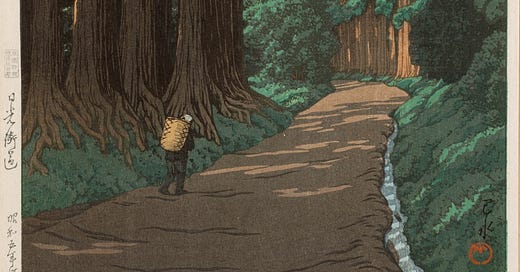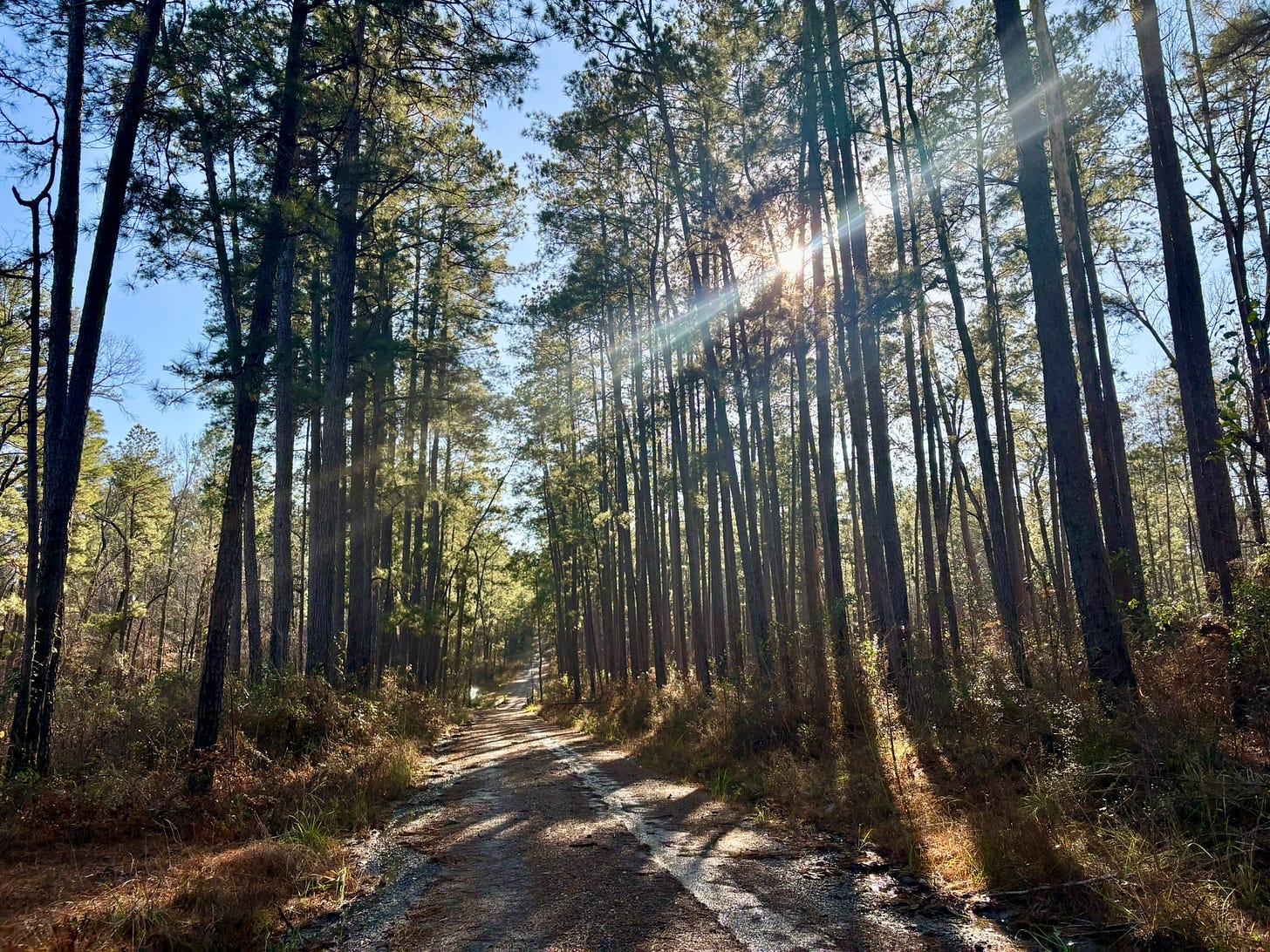There’s something maddening about how much we experience and feel in life, only to hit a brick wall when we try to communicate it. No matter how hard we reach for the depth of those emotions, words always fall short. The best we can do is lean on vague terms like “passion,” “love,” “despair,” or “beauty” - words that barely skim the surface of what’s really inside. It’s a curse placed on each of us: this undercurrent of experience that we can never fully express, leaving us restless, tangled in feelings that are too big for language and grasping at straws for help.
Even the sacred words have lost meaning and have been diluted. We might easily say we “love” the new restaurant downtown, and in the same day say that we “love” a partner who brought unimaginable beauty and purpose into our life. We allow the word “beautiful” to apply to both a song that moved us to cry whilst driving on a normal Tuesday and also to a couch we found on facebook marketplace. Or where the word “awesome” has been robbed of its “to inspire awe” definition and has been demoted to casual conversation filler. We say how “amazed” we are by the accomplishments of a friend we feel deep pride and love for, and also that we are “amazed” at how much it rained in the last week. I cannot help but feel we might be doing this wrong, that we might be miscarrying our language. Do we have words that we protect as sacred?
What we feel is complicated, deeply complicated. The human condition is the most written about struggle of all time. It is deeply misunderstood and plagues all of us with pains, uncertainties, tired eyes, and bouts of unexpected joys. We have blanket words to try to give them names, and we even tie handfuls of those words together to be more specific. But we don’t come close. Our words are insufficient at conveying the true essence of experience. “All language is but a poor translation”, Kafka wrote. It’s an approximation of our experience, not a picture of it. There is a huge disparity between our internal worlds and the external means we have to express them.
English is especially fickle. Other languages have some words that punch a bit deeper. In Japanese, there is the word 木漏れ日 (komorebi) which describes the peaceful felt-experience of seeing sunlight pass through moving leaves of a tree (“sunlight leaking through trees” is the most direct translation). An experience so many of us have felt walking through a park and have been moved by. Spanish has the word “sobremesa”, for the time spent sitting at the table after a meal, chatting, relaxing, and enjoying each other’s company. And Japanese again, has the word 幽玄 (yugen) to describe the profound awareness of the universe that triggers feelings too deep for words - the awareness of the beauty of the world and its mysteries. Maybe I should learn Japanese.
I wonder if having this level of specificity gives other cultures a better chance at feeling something more. Could there be an extra degree of appreciation for having the connection to ancestors who also felt so moved by a phenomena that they named it and drew attention to it? When you learn the name of a particular tree species, you’re much more likely to notice that tree in your day-to-day experience. I’d like to believe it has a similar effect for 木漏れ日 or sobremesa or other human moments.
I suspect though it might be better that they remain unnamed. Maybe those moments are more beautiful because we do find ourselves at a loss for words. I do know that if my wish was granted and the vocabulary of our language doubled tomorrow to include the most wonderful words to accurately describe the nuance of the human condition, we would abuse it just as well. We would water down the meanings of those words with overuse for day-to-day things, generational slang would assign new meanings to them, or worse yet we would just forget them entirely. So maybe its better this way - that we have this very rudimentary language and we’re forced to make something beautiful from it with intention and effort.
The first time I ever picked up a journal and committed to writing my thoughts in it was September 2nd 2019. I bought the journal at the New Haven train station in Connecticut. I was returning to West Point alone from what started as a Labor Day weekend in my hometown with a girl I felt something for that I hadn’t felt before. The weekend had gone sour, we split up, and I, experiencing a feeling of heartache and despair that I didn’t know I was capable of, was making my lonely train ride back. It was raining, as it does in any cinematic moment of heartbreak. It was a feeling so visceral and overwhelming that I knew it would send me to an insane asylum if I didn’t try to do something about it. I remember explicitly feeling this same frustration. I was experiencing something so overwhelming and completely life-changing in its potency. But the words I desperately reached for to throw down on paper in messy, thick-ink pen on that bumpy train ride were empty and clichéd. They were a poor translation, a rough approximation leaving so much more to be desired, and thus they were not releasing the pressure in my heart that I needed out. Our curse remains that the best tool we have for surgically carving into our heart to find the things that haunt us in order to understand them or to ask for help wields like a dull, rusty, campfire hatchet.
Since then, it has been an ever growing journey to maintain the effort of applying words to thoughts and feelings so raw, so pure, and so big that they escape language. Many years and hundreds of pages more like those later, and I have a better idea why - or at least a better idea how to reconcile these facts. Our curse is both frustrating and beautiful. It is the fire that warms us and the fire that burns us. We have inherited the ability to communicate to our brothers and sisters thoughts and ideas, but when it comes time to connect in a human-way the big and scary things in us - taboo and the limitation of language stand in our way. But this can be good. In the imagined world where our language is perfect and we have the best word in our satchel for every particular thing our heart can feel, we would have never needed to take things to another level in order to express them: music, poetry, movies, novels and art in general. This gap between our human experience and the limit of our words is filled by these expressions and they connect us in ways that language on its own could never.
And so we persevere in trying to express the complexity and depth of our experience. Where language fails to express heartache, the meter, rhythm, and delicate nature of poetry gets it one step closer to filling the gap. Where language could never present the feeling of gratitude and contentedness your soul feels during a calm humid sunset on a warm summer evening, a slow pedal steel and easy folk lyrics from a bluetooth speaker help us feel it deeper. And where language fails to paint the true picture of human suffering and tragedy, storytelling from novelists, journalists and photographers help get us ever closer to understanding. But even still, they do not bridge the gap totally. They are transcendent but only approximate some amount closer. And so, whether it be out of the irony of our condition or out of simple necessity, it may be that the best thing for appreciating the true depth of our experience, anyhow, is silence.
Silence is an ocean. Speech is a river.
When the ocean is searching for you,
don’t walk into the language-river.
Listen to the ocean;
bring your chattering business to an end.
Traditional words are just babbling
in that presence,
and babbling is a substitute for sight.
Rumi





